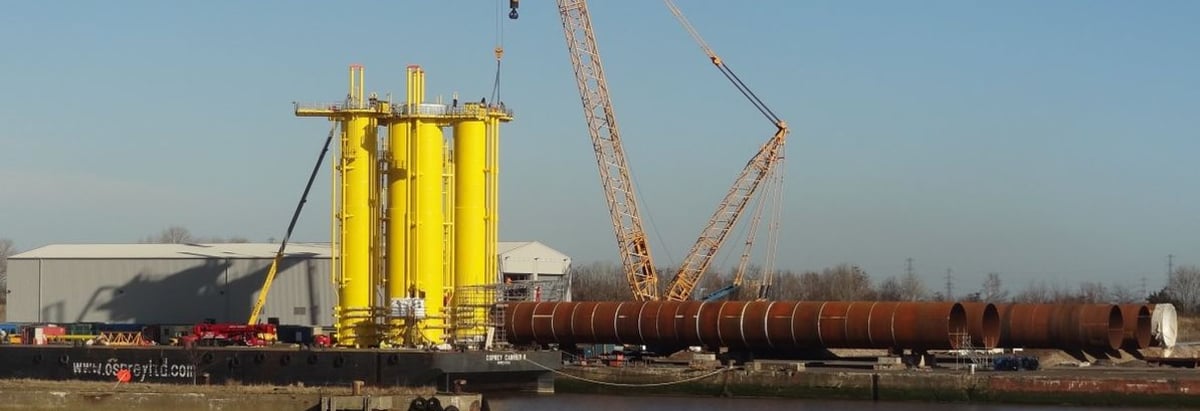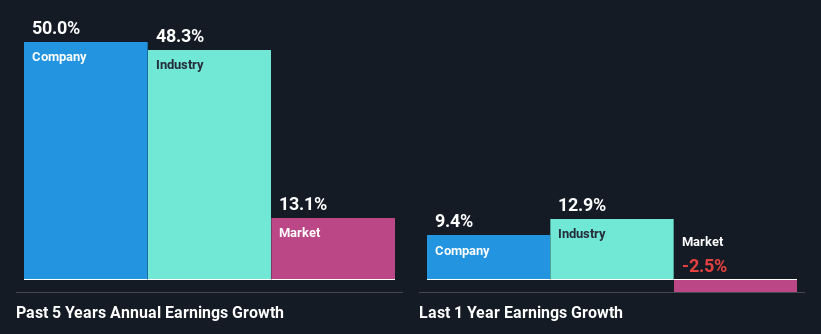- United States
- /
- Energy Services
- /
- NYSE:HAL
Halliburton Company's (NYSE:HAL) Stock Has Been Sliding But Fundamentals Look Strong: Is The Market Wrong?

It is hard to get excited after looking at Halliburton's (NYSE:HAL) recent performance, when its stock has declined 17% over the past three months. However, a closer look at its sound financials might cause you to think again. Given that fundamentals usually drive long-term market outcomes, the company is worth looking at. Specifically, we decided to study Halliburton's ROE in this article.
Return on Equity or ROE is a test of how effectively a company is growing its value and managing investors’ money. In simpler terms, it measures the profitability of a company in relation to shareholder's equity.
See our latest analysis for Halliburton
How Do You Calculate Return On Equity?
The formula for ROE is:
Return on Equity = Net Profit (from continuing operations) ÷ Shareholders' Equity
So, based on the above formula, the ROE for Halliburton is:
27% = US$2.7b ÷ US$10b (Based on the trailing twelve months to June 2024).
The 'return' is the yearly profit. So, this means that for every $1 of its shareholder's investments, the company generates a profit of $0.27.
What Has ROE Got To Do With Earnings Growth?
Thus far, we have learned that ROE measures how efficiently a company is generating its profits. Depending on how much of these profits the company reinvests or "retains", and how effectively it does so, we are then able to assess a company’s earnings growth potential. Assuming all else is equal, companies that have both a higher return on equity and higher profit retention are usually the ones that have a higher growth rate when compared to companies that don't have the same features.
Halliburton's Earnings Growth And 27% ROE
First thing first, we like that Halliburton has an impressive ROE. Second, a comparison with the average ROE reported by the industry of 13% also doesn't go unnoticed by us. As a result, Halliburton's exceptional 50% net income growth seen over the past five years, doesn't come as a surprise.
We then performed a comparison between Halliburton's net income growth with the industry, which revealed that the company's growth is similar to the average industry growth of 48% in the same 5-year period.

The basis for attaching value to a company is, to a great extent, tied to its earnings growth. It’s important for an investor to know whether the market has priced in the company's expected earnings growth (or decline). By doing so, they will have an idea if the stock is headed into clear blue waters or if swampy waters await. One good indicator of expected earnings growth is the P/E ratio which determines the price the market is willing to pay for a stock based on its earnings prospects. So, you may want to check if Halliburton is trading on a high P/E or a low P/E, relative to its industry.
Is Halliburton Efficiently Re-investing Its Profits?
Halliburton's ' three-year median payout ratio is on the lower side at 22% implying that it is retaining a higher percentage (78%) of its profits. So it looks like Halliburton is reinvesting profits heavily to grow its business, which shows in its earnings growth.
Besides, Halliburton has been paying dividends for at least ten years or more. This shows that the company is committed to sharing profits with its shareholders. Based on the latest analysts' estimates, we found that the company's future payout ratio over the next three years is expected to hold steady at 20%. As a result, Halliburton's ROE is not expected to change by much either, which we inferred from the analyst estimate of 22% for future ROE.
Conclusion
Overall, we are quite pleased with Halliburton's performance. Specifically, we like that the company is reinvesting a huge chunk of its profits at a high rate of return. This of course has caused the company to see substantial growth in its earnings. That being so, a study of the latest analyst forecasts show that the company is expected to see a slowdown in its future earnings growth. Are these analysts expectations based on the broad expectations for the industry, or on the company's fundamentals? Click here to be taken to our analyst's forecasts page for the company.
Valuation is complex, but we're here to simplify it.
Discover if Halliburton might be undervalued or overvalued with our detailed analysis, featuring fair value estimates, potential risks, dividends, insider trades, and its financial condition.
Access Free AnalysisHave feedback on this article? Concerned about the content? Get in touch with us directly. Alternatively, email editorial-team (at) simplywallst.com.
This article by Simply Wall St is general in nature. We provide commentary based on historical data and analyst forecasts only using an unbiased methodology and our articles are not intended to be financial advice. It does not constitute a recommendation to buy or sell any stock, and does not take account of your objectives, or your financial situation. We aim to bring you long-term focused analysis driven by fundamental data. Note that our analysis may not factor in the latest price-sensitive company announcements or qualitative material. Simply Wall St has no position in any stocks mentioned.
About NYSE:HAL
Halliburton
Provides products and services to the energy industry worldwide.
Very undervalued with excellent balance sheet and pays a dividend.


